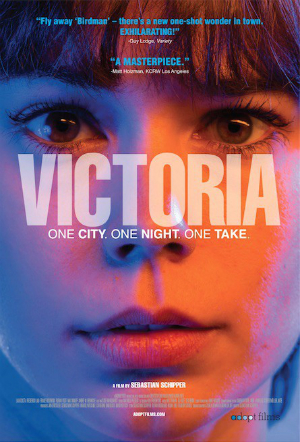
If one were to poll ‘cinephiles,’ I’m willing to bet a good majority would agree that the unbroken long shot is one of the more invigorating aspects of movie-watching. When they’re done right, nothing comes close to the virtuoso thrill of seamless acting and orchestrated camera movement.
The New Year’s Eve party sequence in P.T. Anderson’s Boogie Nights. Acclaimed Russian filmmaker Alexander Sokurov’s single shot/full length film Russian Ark. The bustling opening of Brian DePalma’s Snake Eyes. And my personal favorite from Mikhail Kalatozov’s 1964 Marxist propaganda film titled I Am Cuba, in which the camera seems to defy gravity by climbing walls, pushing through windows and floating in mid air as it follows a thousand man funeral procession.
Trying to outdo all of those above mentioned efforts, Sebastian Schipper’s Victoria ups the ante and showcases a handheld camera shot for the entire duration of its 2 hour and 15 minute running time. The camera bounces around its few characters, juts in and out of vehicles with them and, at least to this reviewer’s eye, doesn’t feature any of the old “cheats” such as hidden edits or trickery. Of course, this is digital filmmaking and one can just shoot…. and shoot…. but the logistical intricacy of nailing the right perspective or not having one of the actors flub an action or any other unwitting mistake is a mind-boggling feat, to say the least. But, all that technical wizardry aside, Victoria suffers in some of its other attributes.
Opening on pretty Spaniard Victoria (Laia Costa) as she dances the night away in a sub-level German nightclub, her loneliness is hinted at quickly as she buys herself a drink at the bar and then hits on the bartender, who shrugs her off briskly. On her way out into the early morning streets, she meets four half-drunk but mildly charming guys. There’s Blinker (Burak Yigit), Boxer (Franz Rogowski), Fizz (Max Mauf) and the seeming leader of the pack, Sonne (Frederick Lau), who flirts heavily with Victoria. She openly returns the attraction.
The first hour of the film follows the five as they roam the pre-dawn streets of Berlin, and Victoria often feels like a punk rock version of Richard Linklater’s Before Sunrise trilogy — without the magnanimous charm, of course. They stow away to a rooftop hideout, smoking and drinking and exchange laborious conversations that drunk people typically have. There’s a lot of stuttering, repeating phrases and machismo that substitutes for plot development and character amiability. It’s obvious there’s a general script, but in favor of the single-shot aesthetic, the film wallows in off-handed improvisation and lurches forward with little momentum.
Things pick up a bit at the one-hour mark when, after poor Fizz becomes too inebriated to follow through on some unspecified commitment the group has planned, dashing Sonne convinces Victoria to be their driver to a shadowy meeting in a concrete parking garage. Like Alice in Wonderland, Victoria is soon plunged into a chaotic and violent succession of events that swerves out of control.
For Victoria to be a completely enveloping experience and not just a gimmick, it needs something more than what it offers. By distilling itself into real time (i.e. the entire film takes place within its marginal two and a half hour running time), it asks the viewer to believe that seemingly responsible and intelligent Victoria would allow herself to be manipulated so quickly by this obvious group of thugs, metastasized from care-free night clubber to gun-toting criminal in the span of an hour. Victoria doesn’t convincingly sell this arch.
In addition to that, Sonne and his group of ‘brothers,’ as they refer to one another, have to be some of the stupidest criminals out there, full of whiplash energy, unconvincing thug posture and complete lack of self awareness. They’re played like a rehash of every kitchen sink gangster put on celluloid, which is yet another incomprehensible reason young Victoria falls in with them.
Consider me one of the aforementioned cinephiles, but once the allure of Victoria wears off, it becomes a fairly unbelievable film that may have fared better in a more pragmatic and routine narrative, as much as I hate to admit it. It’s not a completely bad film, it’s just wildly unfocused on the driving emotions of what makes its characters tick. And if the motivating factors of why people are doing what they’re doing don’t exist, all the technical bravura in the world can’t save it.
Victoria opens on Friday, November 27, at the Angelika Film Center in Dallas.
